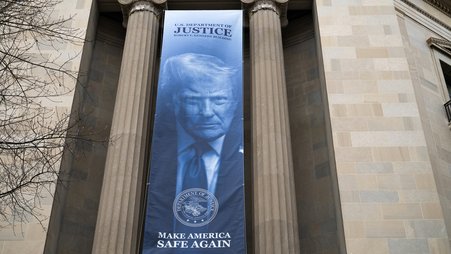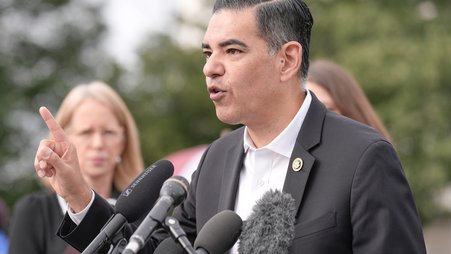Chicago journalist Jim DeRogatis is no criminal, but in 2008 he invoked the Fifth Amendment to avoid testifying at music superstar R. Kelly’s trial. It’s a strategy that more journalists unfortunately may need to consider.
Years earlier, someone sent an unmarked VHS tape depicting Kelly abusing a young girl to DeRogatis. His reporting led to Kelly’s indictment and trial. (The musician was acquitted but is currently in prison for related convictions over a decade later.)
Subpoenaed to testify, DeRogatis, then with the Chicago Sun-Times, invoked Illinois’ reporter’s privilege law. Judge Vincent Gaughan ordered him to take the stand anyway.
But his lawyers (I was a clerk at the firm representing him) realized DeRogatis had potentially, albeit involuntarily, possessed a video containing child sexual abuse material, or CSAM. That is, of course, illegal. Gaughan had no choice but to acknowledge that the prospect that DeRogatis could be prosecuted, however remote, entitled him to invoke his Fifth Amendment protection against self-incrimination.
At the time, DeRogatis’ strategy might’ve been a stretch in non-CSAM cases. Newsgathering is generally safeguarded by the First Amendment. Most journalists need not worry about prosecution.
But things have changed, even if the constitution hasn’t. Here’s a non-exhaustive list of some ways officials around the country have tried to criminalize routine newsgathering in recent years.
- Prosecutors in Kansas claimed that using a government website violated state computer crime and identity theft laws.
- Prosecutors in Alabama charged journalists for reporting on a grand jury proceeding.
- A city attorney in San Francisco, California, accused a journalist of breaking the law by reporting on a tech executive’s sealed arrest report.
- A state senator in Arizona got a restraining order against a journalist who knocked on her door.
- A Tampa, Florida, fire chief called police on a journalist for asking for public records.
- A Chicago suburb ticketed a reporter for calling government officials too often.
- A Texas citizen journalist was arrested for asking police officers questions.
- Another Texas citizen journalist was arrested for filming police in public.
- The Los Angeles County Sheriff’s Department pushed for prosecuting a journalist who reported on a leaked list of problem deputies.
- Missouri’s governor sought to prosecute a journalist who alerted the state of a security vulnerability on its website.
- A California city sued a blog under computer crime laws for accessing a publicly available Dropbox.
- An Ohio journalist was charged for publishing a source’s recording of a court proceeding.
- Two North Carolina journalists were arrested for reporting on police operations after a park curfew.
- The federal government argued that publishers could be charged with possessing and transporting stolen property for acquiring documents a source stole.
- The Biden administration extracted a guilty plea from WikiLeaks founder Julian Assange under the Espionage Act for obtaining and publishing government documents from a source.
- It also prosecuted journalist Tim Burke under computer fraud and wiretapping laws for downloading publicly available materials on the internet. The case remains pending.
- The current interim U.S. attorney for the District of Columbia, Ed Martin, has suggested he believes naming federal employees or impeding government work to be illegal.
- President Donald Trump said in a nationally televised address that he thinks reporting he views as biased against him is against the law.
- Masked federal agents abducted a graduate student from Tufts University in Massachusetts, and the government revoked her student visa. Her friends think it’s because she cowrote a pro-Palestine op-ed.
If officials keep telling us they see journalism as criminal, journalists should believe them and exercise their rights accordingly. It’ll understandably leave a bad taste in journalists’ mouths to plead the Fifth, but doing so isn’t an admission that you’re guilty — only that the government might think so.
If nothing else, it’ll make quite a statement about the state of press freedom for journalists to have to plead the Fifth like criminals. And in light of the cases listed above, there are hardly any circumstances under which a journalist asked to testify about sources or newsgathering methods doesn’t have a legitimate concern about self-incrimination.
Published documents from the internet against someone’s wishes? Met a confidential source in the park after dark? Obtained names of government workers? Possessed and transported source documents? Your fear of being prosecuted may be every bit as legitimate as DeRogatis’, and arguably more so, since you can point to examples, not just hypotheticals.
If officials keep telling us they see journalism as criminal, journalists should believe them and exercise their rights accordingly.
This approach isn’t foolproof, particularly when journalists are subpoenaed by the government. Prosecutors can offer journalists immunity, mooting self-incrimination concerns. That’s what the Obama administration did when it wanted then-New York Times journalist James Risen to testify.
But prosecutors don’t always offer immunity, which may require approval from higher-ups and create administrative headaches. And in Trump’s made-for-TV administration, the optics of granting immunity to “enemies of the people” may be so unappealing that they’d rather forgo the testimony.
Plus, many subpoenas to journalists aren’t issued by the government. Some are issued by defense lawyers, others by private litigants in civil lawsuits. The government is unlikely to offer immunity under these circumstances. And agencies like U.S. Immigration and Customs Enforcement, known to issue its own administrative subpoenas to journalists, don’t have the authority to grant immunity on their own.
Even before the recent wave of anti-press criminal theories, journalists like the Detroit Free Press’ David Ashenfelter were able to successfully plead the Fifth in non-CSAM cases. He was subpoenaed in a federal Privacy Act lawsuit over his reporting on a terrorism investigation. After the court declined to apply the reporter’s privilege, he invoked his right against self-incrimination because he could, conceivably, be prosecuted for receiving confidential Justice Department materials.
And almost 20 years ago, Peter Scheer wrote that journalists should consider the Fifth in light of then-Attorney General Alberto Gonzales’ comments in an ABC News interview that journalists could be prosecuted for publishing government secrets.
That prospect is far more realistic now, after the Assange plea deal. We’re no longer talking about TV interviews, but an actual conviction.
I’m not your attorney. I’m not telling you what to do or how. Every case is different. But if you’re subpoenaed and a judge rejects the reporter’s privilege, consider asking your lawyer if the Fifth is an option.
It’s a shame that journalists need to even think about this kind of thing, but protecting sources is paramount, now more than ever.





